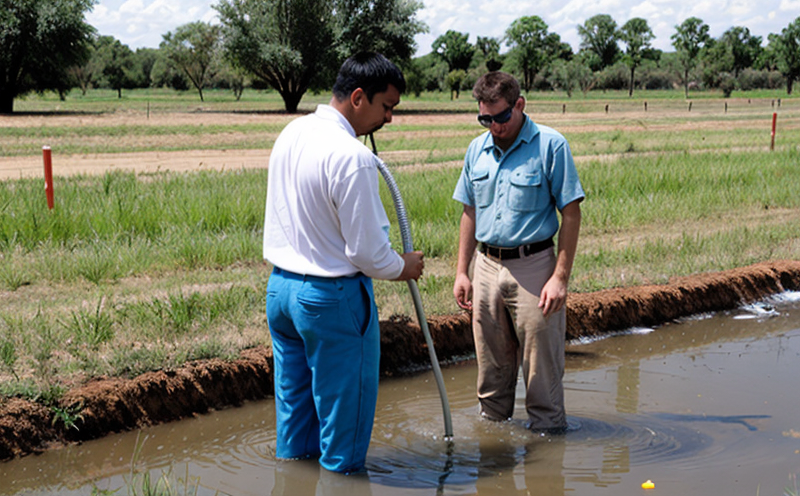ISO 6341 Daphnia Immobilisation Toxicity Test in Groundwater
The ISO 6341 Daphnia Immobilisation Toxicity (DIT) test is a critical method used to assess the toxicity of groundwater samples. This test evaluates the acute toxicity by exposing Daphnia magna, an aquatic organism widely recognized for its sensitivity to water quality changes. The test is particularly valuable in environmental monitoring and regulatory compliance processes.
The procedure involves collecting groundwater samples from various depths and locations within aquifers. After collection, these samples are transported under controlled conditions to the laboratory where they undergo rigorous testing. Daphnia magna specimens are then introduced into the sample solutions at defined concentrations. The test measures the proportion of daphnids that become immobilized over a specified period.
The primary objective of this test is to determine whether groundwater meets regulatory standards for protecting aquatic life. Regulatory bodies such as the Environmental Protection Agency (EPA) and European Union directives often require compliance with these tests before allowing water supplies into public use or industrial processes.
Understanding the toxicity levels helps stakeholders make informed decisions about potential risks associated with using this water source. For instance, if a sample fails to meet acceptable thresholds set by ISO 6341, further investigation may be warranted to identify sources of contamination and implement corrective measures.
The test also plays an essential role in research projects aimed at developing better filtration techniques or understanding how different pollutants affect aquatic ecosystems. By providing precise data on toxicity levels, this method supports both academic inquiry and practical applications such as improving water treatment processes.
Groundwater is a vital resource that sustains ecosystems and human activities across numerous sectors including agriculture, industry, drinking water supply, and natural habitats. Ensuring its quality through thorough testing ensures sustainable use of these resources now and for future generations.
Why It Matters
The ISO 6341 Daphnia Immobilisation Toxicity Test is crucial because it provides a reliable measure of the potential harm that contaminants in groundwater could pose to aquatic organisms. This information is vital for maintaining ecological balance and human health.
- Protects biodiversity by ensuring no harmful concentrations reach aquatic environments.
- Aids in identifying sources of pollution, which can lead to targeted remediation efforts.
- Supports compliance with international standards like ISO 6341 and national regulations regarding water quality.
The test results are used by various stakeholders including government agencies, private companies, and research institutions. These entities rely on accurate data to make informed decisions about water management practices that balance economic growth with environmental protection.
By conducting this type of testing regularly, organizations demonstrate their commitment to sustainable development principles which enhance public trust and credibility among consumers and investors alike.
Eurolab Advantages
Eurolab offers unparalleled expertise in executing the ISO 6341 Daphnia Immobilisation Toxicity Test. Our team of skilled scientists ensures consistent, reliable results that meet or exceed international standards.
- State-of-the-art facilities equipped with advanced instruments for precise sample preparation and analysis.
- A dedicated laboratory network spread across Europe ensuring quick turnaround times regardless of location.
- Comprehensive quality assurance protocols to guarantee the accuracy and reproducibility of test outcomes.
We pride ourselves on providing personalized service tailored to each client's needs. Whether you require one-off tests or ongoing monitoring programs, Eurolab can accommodate your requirements efficiently and effectively.
Customer Impact and Satisfaction
- Enhanced decision-making: Reliable test results empower clients to make sound decisions regarding water quality management.
- Regulatory compliance: By adhering strictly to ISO 6341 guidelines, we help ensure clients stay compliant with relevant regulations worldwide.
Clients report higher levels of satisfaction knowing their tests are conducted by a trusted partner who understands the importance of accurate and timely results. They appreciate our commitment to delivering high-quality service backed by extensive experience in environmental testing.





